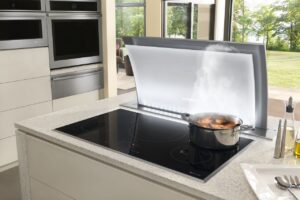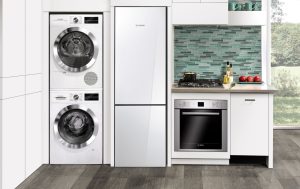Shopping for a New Range? Induction vs Electric

The right range can provide the heart of your kitchen. It not only provides a central focal point, but it needs to offer great functionality. In many homes, the decision for a new range will come down to electric vs induction ranges. Each type has its own advantages and possible drawbacks, so before you make your purchase, it is crucial that you appreciate these differences. So, in this article, we’ll break down the key differences between induction ranges and electric ranges, assess the pros and cons and offer some tips to help you to choose the right one for your kitchen.
The Types of Ranges
Both induction and electric ranges rely on electricity as a power source, but they operate in a fundamentally different way. But whichever type you choose, there are different types of ranges that will determine which best suits your cooking needs and kitchen aesthetic.
Freestanding:
Freestanding ranges are a stand alone unit that you can place anywhere in your kitchen. Providing you have the appropriate electrical hook up, you can install a freestanding range to suit your new kitchen layout.
Slide In:
As the name suggests, slide in ranges are designed to slide between your cabinetry. This allows for a built in look that can work well in a contemporary style kitchen design.
Drop In:
As with slide in ranges, drop in ranges are installed between the cabinetry, but they typically require a custom built base during installation.
Pro Style:
Pro style ranges are large commercial grade appliances. They typically feature a robust construction and high performance burners. You may also be able to access other pro style features that you may not find on standard domestic models.
The Electric Range Basics:
Electric ranges use electrical resistance that is used to heat up coils or a smooth ceramic surface. This provides a hot surface which provides a point of contact for your pots and pans. These ranges can work with any cookware, so you don’t need to purchase new pots if you’ve previously used a gas or other electric range.
Electric ranges tend to be more affordable compared to an induction model, and they are well regarded for their reliability and even cooking.
If flexibility and affordability are at the top of your priority list when it comes to choosing a new range, you’re likely to lean towards an electric range.
The Induction Range Basics:
Induction ranges use electromagnetic field technology that generates a field to directly heat your pots and pans. When you place a compatible pan on the cooktop, the generated electromagnetic field induces an electric current in the pan to generate heat.
This is a highly efficient heating method as heat loss is minimized and offers precise temperature control.
Many people prefer induction ranges as they are energy efficient and offer rapid heating. There are also some unique safety features including cool to touch cooktops. Once the pot is lifted from the cooktop, you won’t get burned if you accidentally touch the surface as it will no longer hold any heat. This can be beneficial if you have concerns about kitchen safety, such as households with young children or the elderly.
If energy efficiency and safety are your priorities, an induction range may win out in the appliance comparison.
Induction vs Electric Ranges: Pros and Cons:
When you’re trying to decide between an induction or electric range, it is important that you appreciate the pros and cons of both options.
Electric:
Electric ranges typically have some great features, but there are some possible drawbacks that you will need to evaluate to determine whether one is the best choice for you.
Pros:
- Budget Friendly: Electric ranges are typically more affordable as they tend to be available at a lower price point.
- Versatility: You can use any type of cookware with an electric range.
- Variety: Since electric ranges are more modestly priced, there tends to be a greater variety of sizes and styles available.
Cons:
- Slower Heating: When compared to induction, it takes far longer to reach the desired cooking temperature with an electric range.
- Fewer Safety Features: An electric range cooktop will remain hot after you’ve finished cooking, which can pose a safety hazard. Additionally, if you accidentally leave the burner on, it can put you at risk of burns.
Induction:
Induction ranges tend to have a wider variety of features, but there are some potential drawbacks.
Pros:
- Energy Efficiency: Since induction directly heats the cookware an induction range uses less energy to reach temperature and for ongoing cooking.
- Speed and Precision: Induction ranges offer rapid, precise temperature control that is ideal if you’re completing delicate cooking tasks.
- Safety: The cooktop on an induction range only works when it is in contact with induction compatible cookware. It remains cool to the touch.
Cons:
- Potential to Buy New Cookware: Induction requires magnetic cookware, so you will need to check if your existing cookware is compatible. In some cases, you may need to invest in some new induction compatible cookware.
- Higher Price Point: Typically, induction ranges tend to be more costly compared to electric ranges. While you may get additional features, you do need to be prepared for a higher price point.
Both electric and induction ranges have their own unique positives and potential negatives. We’ve highlighted many of these pros and cons, but ultimately, when you’re trying to decide between them, you will need to consider your cooking preferences, kitchen set up and budget.
Electric vs Induction: How to Choose a New Range:
With so many models of range available on the market, it can be a little daunting to try to choose the right one for your home. Narrowing it down to whether you choose electric or induction comes down to several factors such as your budget, kitchen layout and cooking style. Fortunately, there are a few tips that can help you to make your final purchase decision.
Your Available Space:
The first consideration for any new appliance is to assess the available space in your kitchen. Unless you are completely renovating your kitchen, you will need to choose a replacement range that can fit in the same space as your existing appliance.
Your Cooking Style:
If you prefer to be able to use a variety of cookware, an electric range could be a good option for you. On the other hand, if your priority is energy efficiency, precision, and speed, you may be better suited to an induction range.
Budget:
Budget should never be the only consideration, but how much your new appliance will cost you is still an important factor. While induction may be more energy efficient, reducing your running costs, the initial purchase price is likely to be higher compared to a similar electric range.
You will also need to think about your existing cookware and whether you will also need to budget for new cookware if you opt for an induction range.
It is always a good idea to consider your budget and then compare the prices of each type. Bear in mind that price should also incorporate value for money. If you are prepared to pay a higher price for more features, it may represent better value compared to another model.
Your Kitchen Set Up:
Finally, think about your kitchen aesthetic and which type of range will best complement it. Consider the functionality and design of the range and how it will work in your kitchen space. If you’re a keen home cook, but have concerns about safety, you may prefer induction. On the other hand, if you don’t tend to require cooking precision to prepare your favorite dishes, you may prefer the more budget friendly electric range models.
By carefully assessing these factors, you should be able to find a range that will not only meet your needs but enhance your cooking experiences. Regardless of whether you decide that induction is better than electric or vice versa, be sure to look for a model that has the features you need to make cooking easier.
FAQs:
What is induction cooking?
Induction uses electromagnetic energy which directly heats your pots and pans. Induction cooking is more efficient and offers faster cooking. But, it does require cast iron, stainless steel or other special cookware to operate.
Which is best?
The choice between electric and induction depends entirely on your personal preferences. Electric ranges are typically more affordable and will work with any cookware, but induction is more energy efficient and provides more precise temperature control.
Can you use cast iron with induction?
Yes, cast iron is compatible with induction technology. The cast iron will respond to the electromagnetic field that is created by the induction cooktop.
Is an induction range worth it?
This will come down to your preferences and what you consider good value for money. If energy efficiency, precise control and quick heating are priorities for you, you may be willing to pay a premium for an induction range. On the other hand, if you simply want reliability and functionality, a lower price electric range may suffice.
If you’re considering a new range, you can explore your options with our collection of induction, electric and gas ranges, or speak to one of our home appliance specialists for further help and guidance.
- What Are Flush-Mount Appliances: Flush-Mount Appliances Explained
- What Appliance Brands Hold Their Value the Longest
- Designing the Ultimate Outdoor Bar: Must-Have Appliances for Year-Round Fun
- Luxury Refrigerator Guide 2025: Built-In vs. Freestanding and What to Know Before You Buy
- How Smart Appliances Are Changing Luxury Kitchen Design in 2025
- The Ultimate Outdoor Grill Guide for 2025: Built-In vs. Freestanding
- Smart Bathroom Faucets & Fixtures in 2025: Blending Technology with Luxury Design
- Built-In Coffee Machines: Are They Worth It for Your Kitchen in 2025?
- How to Choose the Right Dishwasher for Your Home: Noise, Capacity, and Features Explained
- Top 5 Kitchen Appliance Colors and Finishes for 2025 (And How to Match Your Style)






